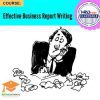Effective Technical Writing
Original price was: RM2,600.00.RM1,100.00Current price is: RM1,100.00.
 |
Introduction:“The source of bad writing is the desire to be something more than a person of sense – the straining to be thought a genius. If people would only say what they have to say in plain terms, how much more eloquent they would be.” – Samuel Taylor Coleridge There are no special kinds of writing. You have to look at it this way. There is only one English Language, and the principles for using it effectively are the same, regardless the subject. In that sense, there are no special kinds of writing. If the subject is technical, it is technical writing. If the subject is financial, it is financial writing. There is just good or bad writing. How Will You BenefitTo help participants to:-
Who Should AttendThis course is suitable for engineers and technical personnel. MethodologyThis stimulating program will maximize understanding and learning through guided learning, open discussion, questions and review of your writing. Module
|
Fee: RM 1,100 per pax
Loyalty Points: 1100 Points
Duration: 2 Days
Note: In-house course is available. Request it HERE
Trainer
Julia Lai Abdullah
Biodata:
Julia is an experienced development & training specialist for over 22 years – with years of experience and exposure in industries such as adult education, hospitality, retailing, manufacturing, banking & finance, insurance and customer service. She influences and spearheads learning in every class participant. Her excellent communication skill, easy-going and motivational style has helped, energized and motivated participants to learn and apply. Julia’s sessions capture the importance – and the art – of believing in self and our abilities to surpass our potential. Her trainings cover People Management, Personal Effectiveness, Grooming and Etiquette, Problem Solving and Decision Making, Customer Relationship Management and the English Language, among others.



